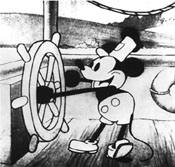June 16, 2006
Pirates, Pirates Everywhere
 The other interesting bit of Larry Lessig's book so far, which is probably worth summarizing, is that most of the major industries in the United States were founded on piracy, or some version of it. Hollywood became the locus of film production because a bunch of filmmakers in the early 20th century wanted to use Thomas Edison's filmmaking technology without permission, and California was far enough away that Edison's MPCC couldn't confiscate all the unlicensed equipment and shut down all the unlicensed films that were being made there. Fox was a major pirate here.
The other interesting bit of Larry Lessig's book so far, which is probably worth summarizing, is that most of the major industries in the United States were founded on piracy, or some version of it. Hollywood became the locus of film production because a bunch of filmmakers in the early 20th century wanted to use Thomas Edison's filmmaking technology without permission, and California was far enough away that Edison's MPCC couldn't confiscate all the unlicensed equipment and shut down all the unlicensed films that were being made there. Fox was a major pirate here.The recording industry? Also founded on some form of piracy, although I'm not sure the legal explanation here. Congress seems to have set a law in 1909 that allowed record companies to distribute copies of recordings so long as they paid the composer a fee set by law. This differs from the book industry, where a publisher who wanted to publish, say, John Grisham's books would have to get permission from, and pay a fee determined by, the author himself (or herself). So recording artists have somewhat weaker rights than authors, thanks to Congress—although this government subsidy of sorts helped the music industry get off the ground.
The same goes for the radio industry: Congress decided that radio stations don't have to pay recording artists to play their songs. The same goes for the cable industry: cable providers weren't required to pay broadcasters to air their content. The same goes for the photography industry: the Supreme Court ruled that you didn't have to get someone's permission to take their picture in public. Walt Disney was founded on a form of blatant "copying" and reworking—"Steamboat Willie" was based heavily on a Buster Keaton film that came out at around the same time—ironic for a company that now lobbies heavily for rather draconian copyright laws.
Anyway, the history is fascinating, but the point here is pretty obvious: in all of these cases Congress allowed what might be considered "piracy" in some sense because it was good for society as a whole. And that's just the argument in the book—intellectual property rights aren't worthwhile in themselves, they're only worthwhile insofar as they promote creativity (and some version of the "public interest"), and if they fail to do that, they should be scrapped. No doubt there are counterarguments here, but he seems pretty convincing to me.
MORE: Relatedly, and since it's Bloomsday today, I should link to this rather infuriating New Yorker piece on Stephen Joyce, the protective grandson of James Joyce who controls the family's literary estate and has literally brought much Joyce scholarship to a grinding halt by refusing to give academics permission to reprint various unpublished material. A lot of scholars have given up and are just planning to wait until 2012 when that stuff goes into the public domain, but if Congress again extends the duration of copyright protections, as it did in 1998, they're screwed.
